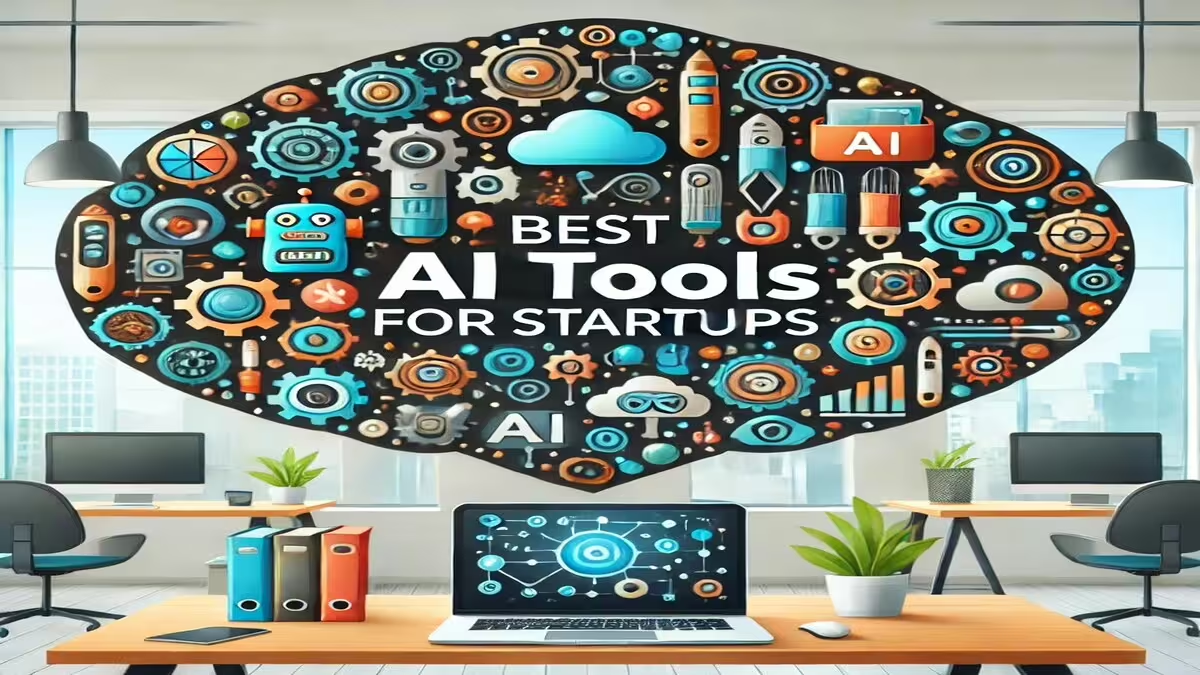In today’s rapidly evolving business landscape, startups are constantly seeking ways to gain a competitive edge and accelerate their growth. Artificial Intelligence (AI) has emerged as a game-changing technology, offering innovative solutions to streamline operations, boost productivity, and drive innovation. This article explores the best AI tools for startups across various domains, from project management to financial analysis.
By leveraging these cutting-edge AI tools, startups can optimize their workflows, make data-driven decisions, and focus on their core competencies. Whether you’re a solo entrepreneur or leading a growing team, these AI-powered solutions can help you work smarter, not harder, and stay ahead in the fast-paced startup ecosystem.
1. Productivity and Project Management
A) ClickUp
ClickUp is an all-in-one productivity platform that integrates AI to streamline task management, collaboration, and project planning. Its AI assistant can help with task creation, time estimation, and even generating project ideas. ClickUp’s versatility makes it an excellent choice for startups looking to centralize their work management.
Key features:
– AI-powered task management and scheduling
– Customizable workflows and views
– Time tracking and reporting
– Integration with 1000+ apps
B) Notion
Notion combines note-taking, databases, and project management into a single, flexible workspace. Its AI capabilities include smart search, content summarization, and automated task creation. Notion’s adaptability allows startups to create a tailored digital headquarters for their teams.
Key features:
– AI-enhanced search and organization
– Customizable templates and databases
– Real-time collaboration
– Knowledge management
2. Content Creation and Copywriting
A) ChatGPT
OpenAI’s ChatGPT has transformed the way we interact with Artificial Intelligence. For startups, it’s an invaluable tool for brainstorming, content creation, and problem-solving. From drafting marketing copy to generating code snippets, ChatGPT’s versatility makes it a must-have for any startup toolkit.
Key features:
– Natural language processing for human-like responses
– Multilingual support
– Contextual understanding for coherent conversations
– Continuous learning and updates
B) Jasper
Jasper (formerly Jarvis) is an AI writing assistant designed specifically for marketing and content creation. It can generate blog posts, social media content, and ad copy, helping startups maintain a consistent content strategy without the need for a large marketing team.
Key features:
– SEO-optimized content generation
– Brand voice customization
– Integration with popular marketing tools
– Plagiarism checker
C) Copy.ai
Copy.ai is another powerful AI writing tool that caters to various content needs. From product descriptions to email subject lines, Copy.ai can help startups create compelling copy across different platforms and formats.
Key features:
– Wide range of content templates
– Multilingual support
– Integration with major platforms like Shopify
– Collaborative features for team use
3. Design and Visual Content
A) Canva
Canva’s AI-powered design platform enables startups to create professional-looking graphics, presentations, and marketing materials without extensive design skills. Its Magic Design feature can generate entire designs from text prompts, saving time and resources.
Key features:
– AI-generated designs and layouts
– Extensive template library
– Brand kit for consistent visuals
– Collaboration tools for team projects
B) DALL-E 2
OpenAI’s DALL-E 2 is a revolutionary image generation AI that can create unique visuals from text descriptions. Startups can use it to generate product concepts, marketing visuals, and even logo ideas, pushing the boundaries of visual creativity.
Key features:
– High-quality image generation from text
– Style and attribute customization
– Editing and variation capabilities
– Commercial usage rights
C) Midjourney
Midjourney is another AI image-generation tool that excels in creating artistic and stylized visuals. It’s particularly useful for startups looking to create unique branding elements or eye-catching social media content.
Key features:
– Diverse artistic styles and aesthetics
– Community-driven platform for inspiration
– High-resolution output options
– Rapid iteration capabilities
4. Marketing and Advertising
A) Albert
Albert is an AI-powered marketing platform that helps startups automate and optimize their digital advertising efforts. By analyzing data across multiple channels, Albert can make real-time decisions to improve campaign performance and ROI.
Key features:
– Cross-channel campaign management
– Autonomous budget allocation
– Predictive analytics for performance optimization
– Natural language reporting
B) AdCreative.ai
AdCreative.ai uses machine learning to generate and optimize ad creatives across various platforms. This tool is particularly valuable for startups looking to scale their advertising efforts without a large creative team.
Key features:
– AI-generated ad visuals and copy
– Performance prediction for creatives
– A/B testing automation
– Integration with major ad platforms
5. Customer Service and Support
A) Intercom
Intercom’s AI-powered chatbots and customer messaging platform help startups provide 24/7 support and engage with customers more effectively. Its Resolution Bot can handle common queries, freeing up human agents for more complex issues.
Key features:
– AI-powered chatbots for instant support
– Customizable conversation flows
– Analytics for measuring support performance
B) Tidio
Tidio offers AI chatbots and live chat solutions that can significantly enhance a startup’s customer service capabilities. Its easy-to-use interface and powerful automation features make it an excellent choice for small teams looking to scale their support operations.
Key features:
– Visual chatbot builder
– Multichannel support (website, Facebook, email)
– Visitor behavior tracking
– Integration with popular e-commerce platforms
6. Financial Management
A) Zeni
Zeni serves as an AI-driven financial management platform for startups, providing a comprehensive suite of services including automated bookkeeping, advanced accounting, and virtual CFO assistance. Its AI technology automates many financial tasks, providing real-time insights and helping startups make informed financial decisions.
Key features:
– Automated bookkeeping and reconciliation
– Real-time financial dashboards
– Burn rate and runway calculations
– Tax preparation and filing assistance
B) Glean.ai
Glean.ai focuses on automating accounts payable processes using AI. It can help startups manage vendor relationships, streamline invoice processing, and gain insights into spending patterns.
Key features:
– AI-powered invoice processing
– Spend analytics and forecasting
– Fraud detection
– Integration with major accounting software
7. Software Development and Coding
A) GitHub Copilot
GitHub Copilot is an AI pair programmer that can significantly boost developers’ productivity. It suggests code completions and entire functions based on context, helping startups accelerate their development cycles.
Key features:
– AI-powered code suggestions
– Support for multiple programming languages
– Integration with popular IDEs
– Contextual understanding of coding patterns
B) Tabnine
Tabnine is another AI-powered code completion tool that learns from a developer’s coding style to provide more accurate and personalized suggestions. It’s particularly useful for startups looking to maintain consistent coding practices across their team.
Key features:
– Personalized code completions
– Local AI model for privacy
– Support for over 30 programming languages
– Team-wide code standardization
8. Business Intelligence and Analytics
A) Tableau
Tableau’s AI-enhanced analytics platform helps startups visualize and understand their data more effectively. Its Ask Data feature allows users to query data using natural language, making advanced analytics accessible to non-technical team members.
Key features:
– AI-driven data visualization
– Natural language queries
– Predictive analytics
– Cloud and on-premise deployment options
B) Looker
Looker, now part of Google Cloud, offers AI-powered business intelligence and data analytics. Its LookML language allows startups to define reusable metrics and create a single source of truth for their data.
Key features:
– Embedded analytics capabilities
– AI-assisted data modeling
– Cross-database joins
– Real-time analytics
Also Read: Revolutionizing Your Job Search: Top AI Tools for Modern Job Seekers in 2024
Conclusion
The AI tools highlighted in this article represent just a fraction of the innovative solutions available to startups today. By strategically implementing these AI-powered tools, startups can enhance their operational efficiency, make data-driven decisions, and focus on their core competencies.
As AI technology continues to evolve, startups must stay informed about new tools and capabilities that could give them a competitive edge. While AI can significantly boost productivity and innovation, it’s important to remember that these tools are meant to augment human skills, not replace them entirely.
Startups should carefully evaluate their specific needs and challenges when choosing AI tools, considering factors such as scalability, integration capabilities, and cost-effectiveness. By harnessing the power of AI, startups can level the playing field with larger competitors and accelerate their path to success in today’s dynamic business landscape.
FAQs
Q1: Are these AI tools suitable for early-stage startups with limited budgets?
A: Many of the tools mentioned offer free tiers or affordable starting plans, making them accessible to early-stage startups. It’s important to evaluate the return on investment for each tool based on your specific needs and growth stage.
Q2: How can startups ensure data security when using AI tools?
A: Look for AI tools that prioritize data security and comply with relevant regulations. Many reputable providers offer enterprise-grade security features, encryption, and data protection policies.
Q3: Do startups need technical expertise to implement these AI tools?
A: While some tools may require basic technical knowledge, many are designed to be user-friendly and accessible to non-technical users. Most providers offer extensive documentation, tutorials, and customer support to help with implementation.
Q4: How often should startups reassess their AI tool stack?
A: It’s advisable to review your AI tool stack regularly, perhaps quarterly or bi-annually, to ensure they still meet your evolving needs. Stay informed about new tools and updates to existing ones that could better serve your startup’s growth.
Q5: Can AI tools replace human employees in a startup?
A: AI tools are designed to augment human capabilities, not replace them entirely. They can handle repetitive tasks and provide valuable insights, allowing human employees to focus on more strategic, creative, and complex aspects of the business.









